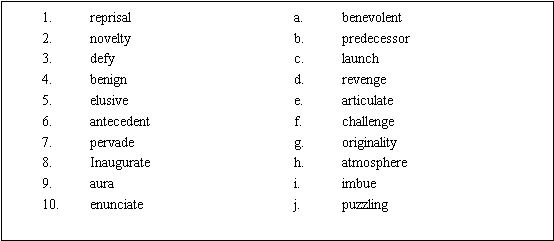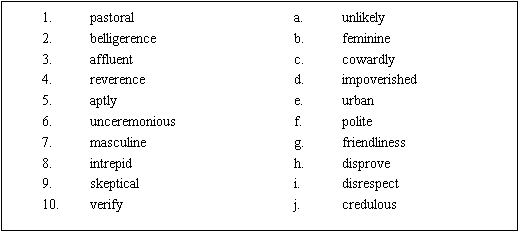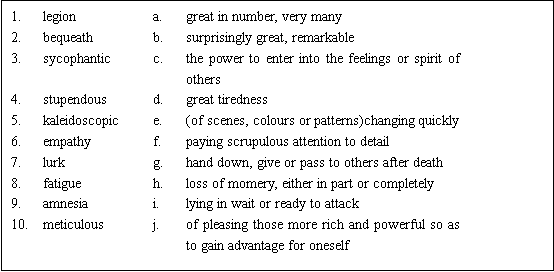I.
Synonyms (10 points, 1 point each)
Find
the words in Column B which are close in meaning to the words
in Column A.
A B

II. Antonyms (10 points,
1 point each)
Find
the words in Column B which are opposite in meaning to the words
in Column A.
A
B

III. Definition (10 points, 1 point each)
Find
the definition for each of the words in the list.

IV. Choose a, b, c or d which is closest
in meaning to the underlined words in the following
sentences. (10 points, 2 point each)
1. Their drivers
had threaded ropes through the noses of the animals to facilitate
their control, yet it
still took the train about a quarter of an hour to swing away
from the center of the road and allow
us to pass.
a.
simplify b. speed up
c. accelerate d.
make easier
2. How do you feel about all this adulation and hero worship?
a.
hatred b.
praise c.
reason d.
love
3. It is this “human-ness” of the gorrila which is so beguiling.
a.
deceiving b.
enchanting c.
moving d.
praiseworthy
4. In short, a lot of television usurps one of the most precious
of all human gifts, the ability to focus
your attention yourself, rather than just passively surrender
it.
a.
encroaches
b. uses
c. steals d.
takes
5. To me, there is something inhuman, something callous and
almost bovine, in the practice.
a.
disgusting
b. irrational c.
indifferent d. hateful
V. Explanation (10 points, 2 points each)
1. Nothing stands between me and half-a-dozen imperishable masterpieces
but pens, ink and paper.
2. But there is a man in my office, a Mr. H., who proses it
way from morning to night, and never gets beyond
corporal and material verities!
3. I knew that I had a facility with words and a power of facing
unpleasant facts, and I felt this created
a sort of private world in which I could get my own back for
my failure in everyday life.
4. It is his job, no doubt, to discipline his temperament and
avoid getting stuck at some immature stage,
or in some perverse mood.
5. It can be seen how these various impulses must war against
one another, and how they must fluctuate from
person to person and from time to time.
VI. Read the following text and fill each of the numbered spaces
with ONE suitable word. (10 points, 0.5 point each)
The earliest settlers came
to the North American continent to establish colonies which
were free from the controls that existed in European societies.
They wanted to (1)_____ the controls that placed on their lives
by kings and governments, priests and churches, noblemen and
aristocrats. To a great (2)_____, they succeeded. In 1776 the
British colonial settlers (3)______their independence from England
and (4)_____ a new nation, the United States of America. In
(5)_____doing, they overthrew the king of the England and declared
that the power to govern would lie in the (6)_____of the people.
They were now (7)_____from the power of the kings. In 1787,
when they (8)______ the Constitution for their new nation, they
separated church and state so that there would never be a government-supported
church. This greatly (9)_____ the power of the church. Also,
in this Constitution they expressly forbade titles of nobility
to ensure that an aristocratic society would not develop. There
would be (10)_____ ruling class of noblemen in the new nation.
This historic decision (11)_____by those
first settlers have had a profound (12)_______on the shaping
of the American character. By limiting the power of the government
and the churches and eliminating a formal aristocracy, they
(13)______a climate of freedom where the emphasis was (14)______the
individual. The United States came to be associated in their
minds (15)_____ the concept of individual freedom. This is probably
the most (16)_____ of all the American values. Scholars and
outside observers often (17)______this value “individualism”,
but many Americans use the word “freedom”. Perhaps the word
is one of the most respected popular words in the United States
today.
By “freedom”, Americans (18)______ the
desire and the ability of all individuals to control their own
destiny without outside interference from the government, a
ruling noble class, the church or (19)______other organized
authority. The desire to be free of controls was a basic value
of the new nation in1776, and it has continued to (20)_____
immigrant to this country.
VII.
Reading Comprehension. (40 points)
Read the following
writing and then answer the questions.
Christmas
Day in the Morning
by
Pearl S. Buck
1. He woke suddenly and completely. It was four o’clock, the
hour at which his father had always called him to get up and
help with the milking. Strange how the habits of his youth
clung to him still! His father had been dead for thirty years,
and yet he still waked at four o’clock in the morning. But
this morning, because it was Christmas, he did not try to
sleep again.
2. Yet what was the magic of Christmas now? His childhood
and youth were long past, and his own children had grown up
and gone.
3. Yesterday his wife had said, “It isn’t worthwhile, perhaps—”
And he has said, “Oh, yes, Alice, even if there are only the
two of us, let’s have a Christmas of our own.”
4. Then she had said, “Let’s not trim the tree until tomorrow,
Robert. I’m tired.”
5. He had agreed, and the tree was still out by the back door.
6. He lay in his bed in his room. The door to her room was
shut because she was a light sleeper. Years ago they had decided
to use separate rooms. Neither of them slept as well as they
once had. They had been married so long that nothing could
separate them, actually.
7. Why did he feel so awake tonight? For it was still night,
a clear and starry night. No moon, of course, but the stars
were extraordinary! Now that he thought of it, the stars seemed
always large and clear before the dawn of Christmas Day.
8. He slipped back in time, as he did so easily nowadays.
He was fifteen years old and still on his father’s farm. He
loved his father. He had not known it until one day a few
days before Christmas, when he had overheard what his father
was saying to his mother.
9. “Marry, I hate to call Rob in the mornings. He’s growing
so fast, and he needs his sleep. I wish I could manage alone.”
10. “Well, you can’t, Adam.” His mother’s voice was brisk.
“Besides, he isn’t a child any more. It’s time he took his
turn.”
11. “Yes,” his father said slowly. “But I sure do hate to
wake him.” When he heard these words, something in him woke:
his father loved him! He had never thought of it before, taking
for granted the tie of their blood. Now that he knew his father
loved him, there would be no more loitering in the mornings
and having to be called again. He got up after that, stumbling
blind with sleep, and pulled on his clothes.
12. And then on the night before Christmas, he lay thinking
about the next day. They were poor, and most of the excitement
was in the turkey they had raised themselves and in the mince
pies his mother made. His sisters sewed presents, and his
mother and father always bought something he needed, not only
a warm jacket, maybe, but something more, such as a book.
And he always saved and bought them each something, too.
13. He wished, that Christmas he was fifteen, he had a better
present for his father instead of the usual tie from the ten-cent
store. He lay on his side and looked out of his attic window.
14. “Dad,” he had once asked when he was a little boy, “What
is a stable?”
15. “It’s just a barn,” his father had replied, “like ours.”
16. Then Jesus had been born in a barn, and to a barn the
shepherds and the Wise Men had come, bringing their Christmas
gifts!
17. A thought struck him like a silver dagger. Why should
he not give his father a special gift, out there in the barn!
He could get up earlier, creep into the barn and get all the
milking done. And then when his father went in to start the
milking, he’d see it all done.
18. He laughed to himself as he gazed at the stars. It was
what he would do, and he mustn’t sleep too soundly.
19. He must have waked twenty times, striking a match each
time to look at his old watch.
20. At a quarter to three he got up and crept downstairs,
careful of the creaky boards, and let himself out. A big star
hung low over the roof, a reddish gold. The cows looked at
him, sleepy and surprised. It was early for them, too.
21. But they accepted him placidly and he fetched some hay
for each cow and then got the milking pail and the big milk
cans.
22. He had never milked all alone before, but it seemed almost
easy. He smiled and milked steadily, two strong streams rushing
into the pail, frothing and fragrant. The cows were behaving
well, as though they knew it was Christmas.
23. The task went more easily than he had ever known it to
before. Milking for once was not a chore. It was a gift to
his father. He finished, the two milk cans were full, and
he covered them and closed the milk-house door carefully,
making sure of the latch. He put the stool in its place by
the door and hung up the clean milk pail. Then he went out
of the barn and barred the door behind him.
24. Back in his room he had only a minute to pull off his
clothes and jump into bed, for he heard his father up. He
put the covers over his head to silence his quick breathing.
The door opened.
25. “Rob!” his father called. “We have to get up, son, even
if it is Christmas.”
26. “Aw-right,” he said sleepily.
27. “I’ll go on out,” his father said. “I’ll get things started.”
28. The door closed and he lay still, laughing to himself.
In just a few minutes his father would know. His dancing heart
was ready to jump from his body.
29. The minutes were endless—ten, fifteen, he did not know
how many—and he heard his father’s footsteps again. The door
opened.
30. “Rob!”
31. “Yes, Dad—”
32. “You son of a –” His father was laughing, a queer sobbing
sort of a laugh. “Thought you’d fool me, did you!” His father
was standing beside his bed, feeling for him, pulling away
the cover.
33. “It’s for Christmas, Dad!”
34. He found his father and clutched him in a great hug. He
felt his father’s arms go around him. It was dark, and they
could not see each other’s faces.
35. “Son, I thank you. Nobody ever did a nicer thing—”
36. “Oh, Dad, I want you to know—I do want to be good!” The
words broke from him of their own will. He did not know what
to say. His heart was bursting with love.
37. “Well, I reckon I can go back to sleep,” his father said
after a moment. “No, listen—the little ones are waked up.
Come to think of it, son. I’ve never seen you children when
you first saw the Christmas tree, I was always in the barn.
Come on!”
38. He pulled on his clothes again, and they went down to
the Christmas tree, and soon the sun was creeping up to where
the star had been. Oh, what a Christmas, and how his heart
had nearly burst again with shyness and pride as his father
told his mother about how he, Rob, had got up all by himself.
39. “The best Christmas gift I ever had, and I’ll remember
it, son, every year on Christmas morning, as long as I live.”
40. They had both remembered it, and now that his father was
dead he remembered it alone; that blessed Christmas dawn when,
alone with the cows in the barn, he had made his first gift
of true love. Outside the window now the stars slowly faded.
He got out of bed and put on his slippers and bathrobe and
went softly downstairs. He brought in the tree, and carefully
began to trim it. It was done very soon. He then went to his
library and fetched the little box that contained his special
gift to his wife, a diamond brooch, not large but dainty in
design. But he was not satisfied. He wanted to tell her—to
tell her how much he loved her.
41. How fortunate that he had been able to love! Ah, that
was the true joy of life, the ability to love! For he was
quite sure that some people were genuinely unable to love
anyone. But love was alive in him. It still was.
42. It occurred to him suddenly that it was alive because
long ago it had been born in him when he knew his father loved
him. That was it: love alone could waken love.
43. And this morning, this blessed Christmas morning, he would
give it to his beloved wife. He could write it down in a letter
for her to read and keep forever. He went to his desk and
began: My dearest love…
44. When it was finished, he sealed it and tied it on the
tree. He put out the light and went tiptoeing up the stairs.
The stars in the sky were gone, and the first rays of the
sun were gleaming in the east, such a happy, happy Christmas!
1. True or false. (10 points)
( ) 1)The hero of the story got the habit of getting up early
in the morning since his youthhood.
( ) 2)The old man and his wife used separate bedrooms because
they no longer love each other.
( ) 3)The hero didn’t know that he loved his father nor did
he knew that his father loved him until the Christmas Eve
when he was fifteen years old.
( ) 4)The hero had always been willing to get up early to
help his father with the milking.
( ) 5)His father decided to go to bed since his soon had finished
the milking that Christmas morning.
2. Explanation: (10 points)
1) He slipped back in time, as he did so easily nowadays.
(P8)
2) He never thought
of it before, taking for granted the tie of their blood. (P11)
3) …he got up and
crept downstairs, careful of the creaky boards.. (P20)
4) Milking for once
was not a chore. (P23)
5) The words broke
from him of their own will. (P36)
3. Questions: (10 points)
1) Can you summarize the theme of the story with just one
sentence from the text?
2) Why does the author
choose Christmas as the setting of the story? What’s the significance
of it?
3) What made the old
express his love of his wife on that Christmas day?
4) Can you analyze
the structure of the story according to the chronological
order? How does the setting change in each part?
5) What is the language style of the story? Who are supposed
to be the reader?
4. Point out
the different rhetorical devices used in Paragraphs 17, 19,
20, 22, 32. (10 points)
1) Para. 17
2) Para. 19
3) Para. 20
4) Para. 22
5) Para. 32
|